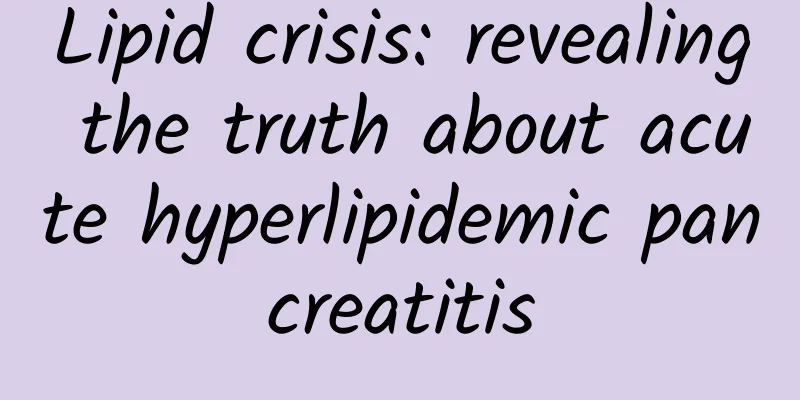Lipid crisis: revealing the truth about acute hyperlipidemic pancreatitis

|
This is the 5289th article of Da Yi Xiao Hu Today, I would like to share with you a real case: Mr. Ma, 43 years old, suddenly felt severe abdominal pain and difficulty breathing after attending a banquet, and was immediately rushed to the hospital by 120. During the emergency treatment and relevant examinations. Shockingly, the blood drawn from Mr. Ma's blood vessels was "stained" with thick white oil. Blood test results: triglycerides as high as 45.37 mol/L, serum amylase was 1014 U/L. Further abdominal CT examination showed that the pancreas was diffusely enlarged with extensive exudation around it; diffuse ground glass exudation also appeared in both lungs. After a comprehensive evaluation, Mr. Ma was diagnosed with acute hyperlipidemic pancreatitis combined with acute respiratory distress syndrome (ARDS), and his condition was critical, so he was immediately rushed to the ICU. He only attended a banquet, why did he suddenly develop such a serious and dangerous condition? Today, let us uncover the truth behind this condition. 1. What is acute hyperlipidemic pancreatitis? Acute hyperlipidemic pancreatitis is a disease caused by a significant increase in the patient's blood lipid level, which leads to pancreatic capillary damage, pancreatic microcirculation disorders, tissue ischemia and hypoxia, and then acute pancreatitis. In recent years, with the improvement of people's living standards and changes in eating habits, the incidence of acute hyperlipidemic pancreatitis has gradually increased, seriously threatening people's health. 2. What are the causes of acute hyperlipidemic pancreatitis? (1) Hypertriglyceridemia This is the main cause of acute hyperlipidemic pancreatitis. When triglyceride levels are too high, they accumulate in the pancreas and activate pancreatic enzymes, breaking down triglycerides into a large number of free fatty acids, which are highly toxic and can easily damage the pancreas and induce acute inflammation. (2) Diet and lifestyle habits Excessive fat intake and heavy drinking are important factors that induce acute pancreatitis. Long-term drinking can lead to poor bile excretion, thereby increasing the risk of pancreatitis. (3) Genetic factors Certain genetic factors may lead to abnormal lipoprotein metabolism, such as familial hypertriglyceridemia, which also increases the risk of acute hyperlipidemic pancreatitis. (4) Other factors Other possible causes include pancreatic duct obstruction, surgery and trauma, medications, infection, and systemic inflammatory response. 3. What are the symptoms of acute hyperlipidemic pancreatitis? Symptoms of acute hyperlipidemic pancreatitis are similar to those of acute pancreatitis and include: (1) Severe abdominal pain Abdominal pain is mostly located in the upper abdomen, and is persistent, piercing or dull, and may radiate to the waist, back and shoulders. (2) Nausea and vomiting Nausea and vomiting often occur at the same time as abdominal pain, and the vomitus are mostly stomach contents. (3) Other symptoms Symptoms include abdominal distension, palpitations, low blood pressure, fever, etc. Severe patients may have pale complexion, cold limbs, increased heart rate, low blood pressure and shock. When combined with acute respiratory distress syndrome, patients may also experience breathing difficulties, decreased blood oxygen saturation, and even life-threatening conditions that require immediate rescue. 4. Treatment of acute hyperlipidemic pancreatitis? The treatment of acute hyperlipidemic pancreatitis requires rapid removal of the primary and secondary factors that cause hyperlipidemia and rapid reduction of serum triglyceride levels to a safe range. Treatment methods include: 1. Lipid-lowering drug treatment; 2. Insulin therapy; 3. Blood purification; 4. Other treatments; 5. How should we prevent acute hyperlipidemic pancreatitis in life? (1) Eat a healthy diet Maintain a low-fat, low-sugar, high-fiber diet, eat more vegetables, fruits and other foods rich in fiber, and reduce the intake of high-fat, high-sugar and high-cholesterol foods. (2) Exercise moderately Insist on moderate exercise, such as walking, jogging, swimming, etc., to enhance cardiopulmonary function and improve the body's metabolism. (3) Control your weight Maintain a healthy weight and avoid obesity. (4) Avoid excessive drinking Alcohol will stimulate pancreatic secretion and increase the burden on the pancreas, so excessive drinking should be avoided. Acute hyperlipidemic pancreatitis is a disease with rapid onset, severe condition, many complications and high mortality rate. Most patients can recover after treatment, but a few may die from complications. Through this popular science article, we know that healthy eating habits, a reasonable lifestyle and regular physical examinations can effectively prevent the occurrence of this disease. If symptoms of pancreatitis occur, you should immediately go to the nearest hospital's emergency department, surgery department or gastroenterology department for treatment. Author: The Second Affiliated Hospital of Xi'an Jiaotong University Written by: Fu Chunxue, resident physician in the emergency department Supervisor: Pei Honghong, Chief Physician of Emergency Department |
<<: Is it necessary to take anti-inflammatory drugs after a burn?
>>: The benefits of eating more dietary fiber
Recommend
What is the normal color of female private parts?
Many women are concerned about the beauty and ski...
All the precautions for kidney stones are here!
Kidney stones are one of the most common diseases...
Can a girl grow taller after having her period at the age of 12?
Menstruation means that girls enter another stage...
Youth With You 2 Wang Ju 2.0 version what is the plot Wang Ju 2.0 version Shangguan Xi'ai personal information introduction
Recently, iQIYI's Youth With You 2 has offici...
How to use sanitary napkins correctly
After buying sanitary napkins, you should use the...
What is the best way to get rid of the cold during the confinement period?
In China, confinement is arguably the biggest eve...
Can women with uterine prolapse have sex?
For female friends with uterine prolapse, the mos...
What is the cause of lumbar sacral pain in women
Symptoms of lumbar pain in women are mainly cause...
What is uterine hypertrophy?
Uterine hypertrophy refers to the symmetrical enl...
What causes pain on the left side of the lower abdomen during menstruation?
Some female friends will feel that their physical...
Is it normal to have back pain during ovulation?
A key time that female friends are concerned abou...
Why can't I burp during pregnancy?
Pregnant women must pay more attention to nutriti...
What to do if breast hyperplasia causes severe pain
Pain is the main clinical manifestation of breast...
Do women still have sexual needs at the age of 50?
When a woman is fifty, her body begins to age. He...
Menstruation is about to end and bleeding
In clinical medicine, some female friends will ex...









